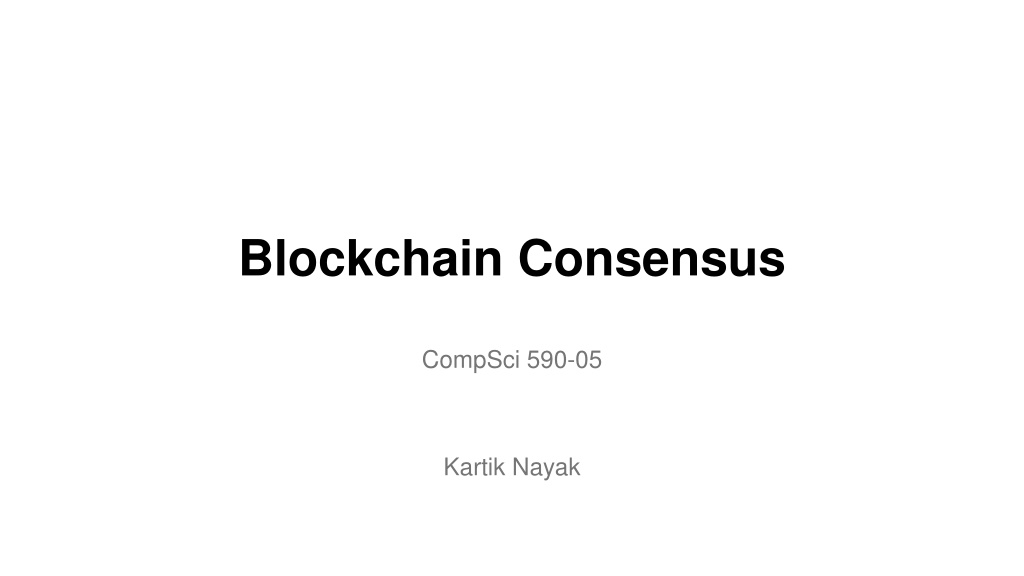
Blockchain Consensus Protocols and Topics Overview
Explore Blockchain ConsensusCompSci 590-05 with Instructor Kartik Nayak focusing on classical and modern consensus protocols, scalability, accountability, and more. Dive into topics like proof-of-work, proof-of-stake, and different blockchain designs.
Uploaded on | 0 Views
Download Presentation

Please find below an Image/Link to download the presentation.
The content on the website is provided AS IS for your information and personal use only. It may not be sold, licensed, or shared on other websites without obtaining consent from the author. If you encounter any issues during the download, it is possible that the publisher has removed the file from their server.
You are allowed to download the files provided on this website for personal or commercial use, subject to the condition that they are used lawfully. All files are the property of their respective owners.
The content on the website is provided AS IS for your information and personal use only. It may not be sold, licensed, or shared on other websites without obtaining consent from the author.
E N D
Presentation Transcript
Blockchain Consensus CompSci 590-05 Kartik Nayak
Instructor Kartik Nayak Research focus: Blockchains and privacy-preserving computation Email: kartik@cs.duke.edu Office hours: Thursdays 11.30 - 12.30 or by appointment Location: LSRC D340 TA Sravya Yandamuri Research focus: Blockchains and applied cryptography Email: sravya.yandamuri@duke.edu
Course Details - - Course webpage: https://courses.cs.duke.edu/fall21/compsci590.5/ Instruction mode: In-person - Zoom, only in exceptional cases Gradescope: For submitting assignments/projects Piazza: For discussions - Signup link: piazza.com/duke/fall2021/compsci5900552121780 - -
Topics Covered in this Course Classical and Modern Consensus Protocols: Problem formulations Consensus under different adversarial fault models, timing and cryptography assumptions, trusted hardware, and relevant lower bounds Understanding primitives such as proof-of-work, proof-of-stake, etc. Scalability considerations: confirmation latency, transaction throughput, energy consumption Holding misbehaving parties accountable Topics related to anonymity and fairness Goal: Understand the similarities and differences that underlie blockchain designs such as Paxos, PBFT, Diem, Bitcoin, Ethereum, Internet Computer, Algorand, etc.
Grading Class participation: 15% Assignments: 30% Class presentation: 20% Project: 35% Blog post: 5% (extra credit) (subject to minor changes)
Class Participation Interactive class Read papers/reference reading materials before _every_ class Ask questions! Interrupt the instructor/presenter!
Assignments We will have two or three assignments in the semester We will use Gradescope to submit assignments ~2 weeks to submit them No additional time
Class Presentation Presenting research papers and leading discussions You will be provided with a list of research papers/topics to choose from. You can choose to present a paper not on the list, but you need to get it approved.
Project In groups of two Broadly, any topic related to distributed computing/blockchains New protocol with better properties Implementation of an existing protocol in a practical setting Analyze and write a paper on a recent blockchain protocol Systemization of knowledge: Pick a sub-topic, read multiple papers in that area and write an SoK Engineering related projects are encouraged Goal: a paper worth publishing in a Computer Security/Distributed Computing workshop or a top-tier conference
Projects - Course on Cryptocurrency and Cryptography by Fan Zhang (CompSci 590-01) - - A common project across the two courses are allowed (and in fact, encouraged) Work and effort needs to be substantially higher - Do not procrastinate
General Guidelines All the submitted work should be your own Unless specified otherwise, for assignments you should not discuss with others or access the internet For projects, it is okay to discuss ideas within the group or with others
References Decentralized thoughts: a decentralized blog Bitcoin and cryptocurrency technologies Foundations of blockchains by Elaine Shi
What are the prerequisites? No formal prerequisites Will help if You have taken any distributed systems or computer security courses before You are comfortable with proof-writing in an Algorithms course, e.g., CompSci 330 In general, It is very easy to come up with an incorrect protocol It is also easy to come up with an incorrect proof
